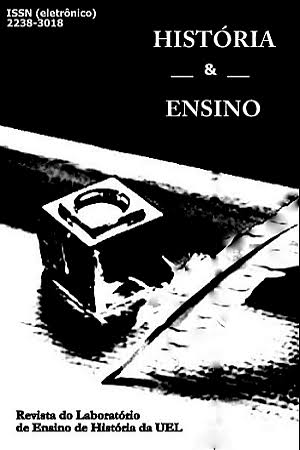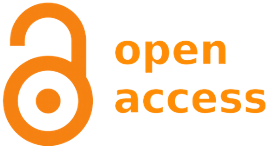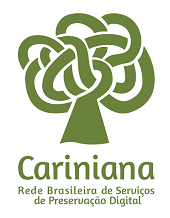There was a stone: dialogues between history teaching and the public history on the implementation of the Law 11.645/08
DOI:
https://doi.org/10.5433/2238-3018.2019v25n2p297Keywords:
Public History, Interculturality, History Teaching (Law 11645-08), Indigenous and African Cultures, Curriculum.Abstract
This paper aims to discuss the new horizons, the challenges and possibilities for the historian, in frontier areas, in an exploratory perspective of the field of Public History. History teaching can be understood in dialogue with this field, as it contributes to the dissemination of historical knowledge. It also intends to demonstrate some potentialities of Public History on the implementation of the Law 11.645/08, through workshops with students of eighth and ninth grade of elementary school at the Altivo César Municipal School, located in the neighborhood of Barreto in Niterói (RJ). These workshops were proposed from the theoretical and conceptual contributions of intercultural theory, considering the specificities of the production of historical school knowledge, with a view to problematizing Brazilian cultural issues and the tensions stemming from the colonization processes. The research began in the same year that Unidos da Viradouro samba school shouted for the local identity of Niterói (which in tupi guarani means "hidden waters") enabling approximations between the students and the invisible narratives in their own city in verses from the Carnival in Sapucai. The Itapuca Stone constitutes one of these narratives and will be explored in this article as a demonstration of the relations established between History Teaching and Public History, being able to help us in the problem that represent another stone on the way: the classroom is no longer hegemonic in accessing knowledge. The methodology adopted was the qualitative approach in action research, with the intention of describing and analyzing the possible ways to implement this law.Downloads
Download data is not yet available.
References
ALBUQUERQUE JUNIOR, D. M. Fazer defeitos nas memórias: para que serve o ensino e a escrita da história? In: GONÇALVES, Márcia de Almeida (org.). Qual o valor da história hoje?. Rio de Janeiro: FGV, 2012. p. 21-39.
ANDRADE, C. D. Alguma poesia. São Paulo: Ed. Pindorama, 1930. ARAÚJO, C. M. Por outras histórias possíveis: em busca de diálogos interculturais em livros didáticos de histórias. 2012. Tese (Doutorado em Educação) - Pontifícia Universidade Católica do Rio de Janeiro, Rio de Janeiro, 2012.
CAUVIN, T. The rise of public history: an international perspective. História Crítica, São Paulo, n. 68, p. 3-26, 2018.
BARCA, Isabel. (Entrevista) "Isabel Barca fala sobre o ensino de História." NICOLIELO, Bruna (Entrevistadora). Revista Nova Escola. Março, 2013. Disponível em: https.//novaescola.org.br/conteudo/930/isabel-barca-falasobre-o-ensino-de-historia. Acesso em 12/12/2015
BHABHA, H. K. O local da cultura. Belo Horizonte: Editora UFMG, 1998.
BENJAMIN, Walter. O Narrador: considerações sobre a obra de Nikolai Leskov. In: Magia e técnica, arte e política: ensaios sobre literatura e história da cultura. São Paulo: Brasiliense, 1994, p. 197-221.
BRASIL. Lei nº 11.645, de 10 Março de 2008. Altera a Lei no 9.394, de 20 de dezembro de 1996, modificada pela Lei no 10.639, de 9 de janeiro de 2003, que estabelece as diretrizes e bases da educação nacional, para incluir no currículo oficial da rede de ensino a obrigatoriedade da temática "História e Cultura Afro-Brasileira e Indígena". Brasília: Presidência da República, 2008. Disponível em: http://www.planalto.gov.br/ccivil_03/_Ato2007- 2010/2008/Lei/L11645.htm. Acesso em: 15 nov. 2018
DELEUZE, G. Foucault. São Paulo: Brasiliense, 1991. CHAMPION, J. What are historians for? Historical Research, Oxford, v. 81, n. 211, feb. 2008.
GABRIEL, C. T. Teorias do currículo e pós-fundacionismo: essencialismos em questão. In: MORGADO, J. C.; SANTOS, L. L. C. P.; PARAÍSO, M. A. (org.). Estudos curriculares: um debate contemporâneo. Curitiba: CRV, 2013. p. 47-64.
GARCÍA CANCLINI, N. Culturas híbridas: estratégias para entrar e sair da modernidade. São Paulo: Edusp, 2006.
FLEURI, R. M. Desafios à Educação Intercultural no Brasil. Educação, Sociedade e Cultura, Porto, n. 16, p. 45-62, 2001.
FONSECA, T. N. L. Ensino de história, mídia e história pública. In: MAUAD, A. M; ALMEIDA, J. R; SANTHIAGO, R (org.). História pública no Brasil: sentidos e itinerários. São Paulo: Letra e Voz, 2016. p. 185-194.
FOUCAULT, M. A arqueologia do saber. 7 ed. Tradução de Luiz Felipe Baeta Neves. Rio de Janeiro: Forense Universitária, 2008.
GREEN, J. Taking history to heart: the power of the past. Massachusetts: University of Massachusetts Press, 2000. GRINBERG, K. Historiadores para que? Ciência Hoje Online, Rio de Janeiro, 9 mar. 2012. Disponível em: http://cienciahoje.uol.com.br/colunas/emtempo/historiadores-pra-que. Acesso: 6 ago. 2015.
HALL, S. A identidade cultural na pós-modernidade. Rio de Janeiro: DP&A EDITORA, 1998. HARTOG, F. Tempo e história: "como escrever a história da França hoje?" História Social, Campinas, n. 3, p.127-154, 1996.
KELLEY, R. Public history: its origins, nature and prospects. The Public Historian, Berkeley, v. 1, n. 1, p. 16-28, 1978.
LACLAU, E.; MOUFLE, C. Hegemony and the socialist strategy: towards a radical democratic politics. Londres: Verso, 1985.
LINDDINGTON, J. O que é história pública? os públicos e seus passados. In: ALMEIDA, J. R; ROVAI, M. G. O. Introdução à história pública. São Paulo: Letra e Voz, 2011. p. 31-52.
LISPECTOR, C. Água viva. Rio de Janeiro: Editora Rocco, 1973.
MATTOS, H; ABREU, M; GURAN, M. Por uma história pública dos africanos escravizados no Brasil. Estudos Históricos, Rio de Janeiro, v. 27, n. 54, p. 255-273, jul/dez 2014. Disponível em: http://www.scielo.br/pdf/eh/v27n54/0103-2186-eh-27-54-0255.pdf. Acesso: 6 ago. 2015.
MONTEIRO, A. F. C. Professores: entre saberes e práticas. Educação & Sociedade, Campinas, ano 23, n. 74, abr. 2001. Disponível em: http://www.scielo.br/pdf/es/v22n74/a08v2274. Acesso em: 30 nov. 2019.
MONTEIRO, A. F. C. A história ensinada: algumas configurações do saber escolar. História & Ensino, Londrina, v. 9, p. 37- 62, 2003. Disponível em: http://www.uel.br/revistas/uel/ index.php/histensino/article/viewFile/12075/10607. Acesso em: 21 out. 2018.
MONTEIRO, A. F. C.; PENNA, F. Ensino de história: saberes em lugar de fronteira. Revista Educação e Realidade, Porto Alegre, v. 36, n. 1, p. 191- 211, jan./abr., 2011. Disponível em: http://www.ufrgs.br/edu_realidade. Acesso em: 21 out. 2018.
NOBRE, D. et al. Sou a terra de Ismael, 'Guanabaran' eu vou cruzar... pra você tiro o chapéu, Rio eu vim te abraçar. Grêmio recreativo escola de samba Unidos da Viradouro.
LIESA, Rio de Janeiro, série A, 2014. Disponível em: http://liesa.globo.com/. Acesso em: 21 out. 2018.
NUNES, B. Fotos da Itapuca. Amigos do Surf. Maricá, 26 ago. 2010. Disponível em: http://itapucasurf.blogspot.com/2010_08_01_archive.html. Acesso em: 21 out. 2018
PIRES, M. F. B. Diálogos interculturais no ensino de história: oficinas pedagógicas para implementação da lei 11.645-08. Rio de Janeiro: PoD editora, 2017.
SARLO, B. Tempo passado: cultura da memória e guinada subjetiva. Belo Horizonte: Ed. UFMG, 2007.
SCHMIDT, M. A. M. S. O ensino de história local e os desafios da formação da consciência histórica. In: MONTEIRO, A. M.; GASPARELLO, A. M.; MAGALHAES, M. S. (org.). Ensino de história: sujeitos, saberes e práticas. Rio Janeiro: Mauad X: FAPERJ, 2007. p. 187-198.
VEIGA-NETO, A. Foucault e a educação. Belo Horizonte: Autêntica, 2007. WALSH, C. Interculturalidad y colonialidad del poder: un pensamiento y posicionamiento "otro" desde la diferencia colonial. In: CASTRO-GÓMEZ, S.; GROSFOGUEL, R. (ed.). El giro decolonial: reflexiones para una diversidad epistémica más allá del capitalismo global. Bogotá: Siglo del Hombre Editores, 2007. p. 47-62.
WANDERLEY, S. Narrativas contemporâneas de história e didática da história escolar. In: MAUAD, A. M; ALMEIDA, J. R; SANTHIAGO, R (org.). História pública no Brasil: sentidos e itinerários. São Paulo: Letra e Voz, 2016. p. 207-217.
ZAHAVI, G. Ensinando história pública no século XXI. In: ALMEIDA, J. R. A.; ROUVAI, M. G. O. (org.). Introdução a história pública. São Paulo: Letra e Voz, 2011. p. 53-63.
ANDRADE, C. D. Alguma poesia. São Paulo: Ed. Pindorama, 1930. ARAÚJO, C. M. Por outras histórias possíveis: em busca de diálogos interculturais em livros didáticos de histórias. 2012. Tese (Doutorado em Educação) - Pontifícia Universidade Católica do Rio de Janeiro, Rio de Janeiro, 2012.
CAUVIN, T. The rise of public history: an international perspective. História Crítica, São Paulo, n. 68, p. 3-26, 2018.
BARCA, Isabel. (Entrevista) "Isabel Barca fala sobre o ensino de História." NICOLIELO, Bruna (Entrevistadora). Revista Nova Escola. Março, 2013. Disponível em: https.//novaescola.org.br/conteudo/930/isabel-barca-falasobre-o-ensino-de-historia. Acesso em 12/12/2015
BHABHA, H. K. O local da cultura. Belo Horizonte: Editora UFMG, 1998.
BENJAMIN, Walter. O Narrador: considerações sobre a obra de Nikolai Leskov. In: Magia e técnica, arte e política: ensaios sobre literatura e história da cultura. São Paulo: Brasiliense, 1994, p. 197-221.
BRASIL. Lei nº 11.645, de 10 Março de 2008. Altera a Lei no 9.394, de 20 de dezembro de 1996, modificada pela Lei no 10.639, de 9 de janeiro de 2003, que estabelece as diretrizes e bases da educação nacional, para incluir no currículo oficial da rede de ensino a obrigatoriedade da temática "História e Cultura Afro-Brasileira e Indígena". Brasília: Presidência da República, 2008. Disponível em: http://www.planalto.gov.br/ccivil_03/_Ato2007- 2010/2008/Lei/L11645.htm. Acesso em: 15 nov. 2018
DELEUZE, G. Foucault. São Paulo: Brasiliense, 1991. CHAMPION, J. What are historians for? Historical Research, Oxford, v. 81, n. 211, feb. 2008.
GABRIEL, C. T. Teorias do currículo e pós-fundacionismo: essencialismos em questão. In: MORGADO, J. C.; SANTOS, L. L. C. P.; PARAÍSO, M. A. (org.). Estudos curriculares: um debate contemporâneo. Curitiba: CRV, 2013. p. 47-64.
GARCÍA CANCLINI, N. Culturas híbridas: estratégias para entrar e sair da modernidade. São Paulo: Edusp, 2006.
FLEURI, R. M. Desafios à Educação Intercultural no Brasil. Educação, Sociedade e Cultura, Porto, n. 16, p. 45-62, 2001.
FONSECA, T. N. L. Ensino de história, mídia e história pública. In: MAUAD, A. M; ALMEIDA, J. R; SANTHIAGO, R (org.). História pública no Brasil: sentidos e itinerários. São Paulo: Letra e Voz, 2016. p. 185-194.
FOUCAULT, M. A arqueologia do saber. 7 ed. Tradução de Luiz Felipe Baeta Neves. Rio de Janeiro: Forense Universitária, 2008.
GREEN, J. Taking history to heart: the power of the past. Massachusetts: University of Massachusetts Press, 2000. GRINBERG, K. Historiadores para que? Ciência Hoje Online, Rio de Janeiro, 9 mar. 2012. Disponível em: http://cienciahoje.uol.com.br/colunas/emtempo/historiadores-pra-que. Acesso: 6 ago. 2015.
HALL, S. A identidade cultural na pós-modernidade. Rio de Janeiro: DP&A EDITORA, 1998. HARTOG, F. Tempo e história: "como escrever a história da França hoje?" História Social, Campinas, n. 3, p.127-154, 1996.
KELLEY, R. Public history: its origins, nature and prospects. The Public Historian, Berkeley, v. 1, n. 1, p. 16-28, 1978.
LACLAU, E.; MOUFLE, C. Hegemony and the socialist strategy: towards a radical democratic politics. Londres: Verso, 1985.
LINDDINGTON, J. O que é história pública? os públicos e seus passados. In: ALMEIDA, J. R; ROVAI, M. G. O. Introdução à história pública. São Paulo: Letra e Voz, 2011. p. 31-52.
LISPECTOR, C. Água viva. Rio de Janeiro: Editora Rocco, 1973.
MATTOS, H; ABREU, M; GURAN, M. Por uma história pública dos africanos escravizados no Brasil. Estudos Históricos, Rio de Janeiro, v. 27, n. 54, p. 255-273, jul/dez 2014. Disponível em: http://www.scielo.br/pdf/eh/v27n54/0103-2186-eh-27-54-0255.pdf. Acesso: 6 ago. 2015.
MONTEIRO, A. F. C. Professores: entre saberes e práticas. Educação & Sociedade, Campinas, ano 23, n. 74, abr. 2001. Disponível em: http://www.scielo.br/pdf/es/v22n74/a08v2274. Acesso em: 30 nov. 2019.
MONTEIRO, A. F. C. A história ensinada: algumas configurações do saber escolar. História & Ensino, Londrina, v. 9, p. 37- 62, 2003. Disponível em: http://www.uel.br/revistas/uel/ index.php/histensino/article/viewFile/12075/10607. Acesso em: 21 out. 2018.
MONTEIRO, A. F. C.; PENNA, F. Ensino de história: saberes em lugar de fronteira. Revista Educação e Realidade, Porto Alegre, v. 36, n. 1, p. 191- 211, jan./abr., 2011. Disponível em: http://www.ufrgs.br/edu_realidade. Acesso em: 21 out. 2018.
NOBRE, D. et al. Sou a terra de Ismael, 'Guanabaran' eu vou cruzar... pra você tiro o chapéu, Rio eu vim te abraçar. Grêmio recreativo escola de samba Unidos da Viradouro.
LIESA, Rio de Janeiro, série A, 2014. Disponível em: http://liesa.globo.com/. Acesso em: 21 out. 2018.
NUNES, B. Fotos da Itapuca. Amigos do Surf. Maricá, 26 ago. 2010. Disponível em: http://itapucasurf.blogspot.com/2010_08_01_archive.html. Acesso em: 21 out. 2018
PIRES, M. F. B. Diálogos interculturais no ensino de história: oficinas pedagógicas para implementação da lei 11.645-08. Rio de Janeiro: PoD editora, 2017.
SARLO, B. Tempo passado: cultura da memória e guinada subjetiva. Belo Horizonte: Ed. UFMG, 2007.
SCHMIDT, M. A. M. S. O ensino de história local e os desafios da formação da consciência histórica. In: MONTEIRO, A. M.; GASPARELLO, A. M.; MAGALHAES, M. S. (org.). Ensino de história: sujeitos, saberes e práticas. Rio Janeiro: Mauad X: FAPERJ, 2007. p. 187-198.
VEIGA-NETO, A. Foucault e a educação. Belo Horizonte: Autêntica, 2007. WALSH, C. Interculturalidad y colonialidad del poder: un pensamiento y posicionamiento "otro" desde la diferencia colonial. In: CASTRO-GÓMEZ, S.; GROSFOGUEL, R. (ed.). El giro decolonial: reflexiones para una diversidad epistémica más allá del capitalismo global. Bogotá: Siglo del Hombre Editores, 2007. p. 47-62.
WANDERLEY, S. Narrativas contemporâneas de história e didática da história escolar. In: MAUAD, A. M; ALMEIDA, J. R; SANTHIAGO, R (org.). História pública no Brasil: sentidos e itinerários. São Paulo: Letra e Voz, 2016. p. 207-217.
ZAHAVI, G. Ensinando história pública no século XXI. In: ALMEIDA, J. R. A.; ROUVAI, M. G. O. (org.). Introdução a história pública. São Paulo: Letra e Voz, 2011. p. 53-63.
Downloads
Published
2019-12-01
How to Cite
Pires, M. de F. B. (2019). There was a stone: dialogues between history teaching and the public history on the implementation of the Law 11.645/08. História & Ensino, 25(2), 297–324. https://doi.org/10.5433/2238-3018.2019v25n2p297
Issue
Section
Artigos
License
Copyright (c) 2020 História & Ensino

This work is licensed under a Creative Commons Attribution 4.0 International License.
História & Ensino adota a licença CC-BY esta licença permite que os reutilizadores distribuam, remixem, adaptem e criem a partir do material em qualquer meio ou formato, desde que a atribuição seja dada ao criador. A licença permite o uso comercial.























